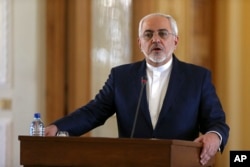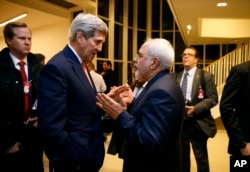Iranian diplomats say they expect President Donald Trump to abandon the international deal restricting Tehran's nuclear activities. They are intensifying their lobbying of European governments, especially the signatories to the agreement, France, Britain and Germany, hoping they can dissuade the U.S. administration from repudiating the agreement.
And in the event the U.S. repudiates the deal, then Tehran is urging Europeans not to join Washington in re-imposing sanctions.
The Iranians say if Europe and the other signatories, Russia and China, stick with the deal and don’t join a renewed sanctions regime, then Tehran will continue to adhere to the agreement.
Iran’s foreign secretary, Mohammad Javad Zarif, highlighted that appeal in an interview with British newspapers published Saturday, warning that if Europe followed Washington’s lead if the Trump administration abandons the deal, Iran would resume uranium enrichment and other aspects of its nuclear program at a more advanced level than before the deal was struck.
Trump on deal
The U.S. State Department is due to certify to Congress in two weeks time whether Iran has been complying with the terms of the deal, formally known as the Joint Comprehensive Plan of Action, or JCPOA. Trump has said he has made up his mind already, but hasn't told European leaders his decision, including Britain’s Theresa May, who asked him reportedly at a bilateral meeting at the UN last month.
Trump has been a stern critic of what his predecessor, Barack Obama, saw as a signature foreign policy achievement.
Dubbing it a “bad deal,” Trump pledged during his campaign for the White House last year to rip up the agreement. And in New York in a speech last month at the UN, he described the deal as an “embarrassment,” saying it was “one of the worst and most one-sided transactions the United States has ever entered into.”
Although the Trump administration has not offered any examples of JCPOA non-compliance by Iran, the belligerency of the President’s comments has heightened impressions that he’s laying the groundwork for the State Department to withhold certification on October 15. The administration is required to report to Congress every 90 days on the deal.
Iran’s intense lobbying effort has two main purposes, say analysts: to get the Europeans to press Washington not to walk away, and in the event President Trump does, to try to ensure the Europeans don’t follow suit — a move that could increase strains between Trump’s Washington and European leaders to a possible breaking point.
European impact
The Europeans would be placed in a lose-lose position, if the U.S. abandons the nuclear deal. Under the agreement’s provisions, any signatory can require the UN Security Council to vote on a resolution to continue the deal’s sanctions relief — a U.S. veto would result in the sanctions on Iran snapping back into place automatically.
That in turn would present the Europeans with the uncomfortable choice of either complying with a UN resolution or re-imposing sanctions against their own policy views. Either way, it would likely compound increasingly tense transatlantic relations.
European signatories to the deal have all publicly defended the nuclear agreement, which placed limits on Iran’s nuclear program designed to prevent Tehran from developing weapons in return for a lifting of international sanctions.
European ambassadors to the U.S. have been highly visible and vocal in Washington in recent days defending the agreement and insisting Iran has remained in compliance. That conclusion was supported last week by U.S. Marine Gen. James Dunford, chairman of the Joint Chiefs of Staff, who in written testimony to a Senate committee said: “The briefings I have received indicate that Iran is adhering to its JCPOA obligations.”
Interviewed by National Public Radio, German envoy Peter Wittig, said Friday: “We believe it would be a mistake to walk away from the deal while Iran is complying.”
European envoys mounted a full-court defense of the nuclear deal last week at a think tank event, arguing Iran is complying with the deal that was struck in July 2015 and implemented since January 2016.
German Chancellor Angela Merkel talked midweek on the phone about Iran with President Trump, expressing her support for the deal. Although, according to German officials, she offered a sympathetic ear to the U.S. leader’s complaints about human rights abuses by Iran and destabilizing activities in the Middle East, including missile development, Tehran’s support for Houthi rebels in Yemen and for groups like Lebanon’s radical Shi’ite movement Hezbollah.
Part of the European lobbying effort on Trump’s Washington — from leaders and envoys — has been to argue that the nuclear deal shouldn’t be sacrificed because of those other areas of concern.
And there has been a quid pro quo hint from the Europeans that they will be more forward-leaning and cooperative with U.S. efforts to contain Iran on other fronts. “European foreign ministers tell me that they would join us in confronting other Iranian misdeeds,” if the Trump administration doesn't abandon the deal, John Kerry, the former U.S. Secretary of State wrote in an opinion article for the Washington Post published Friday.
“Nothing in the agreement is preventing us from facing the challenges raised by Iran on other issues,” according to French Ambassador Gerard Araud.






